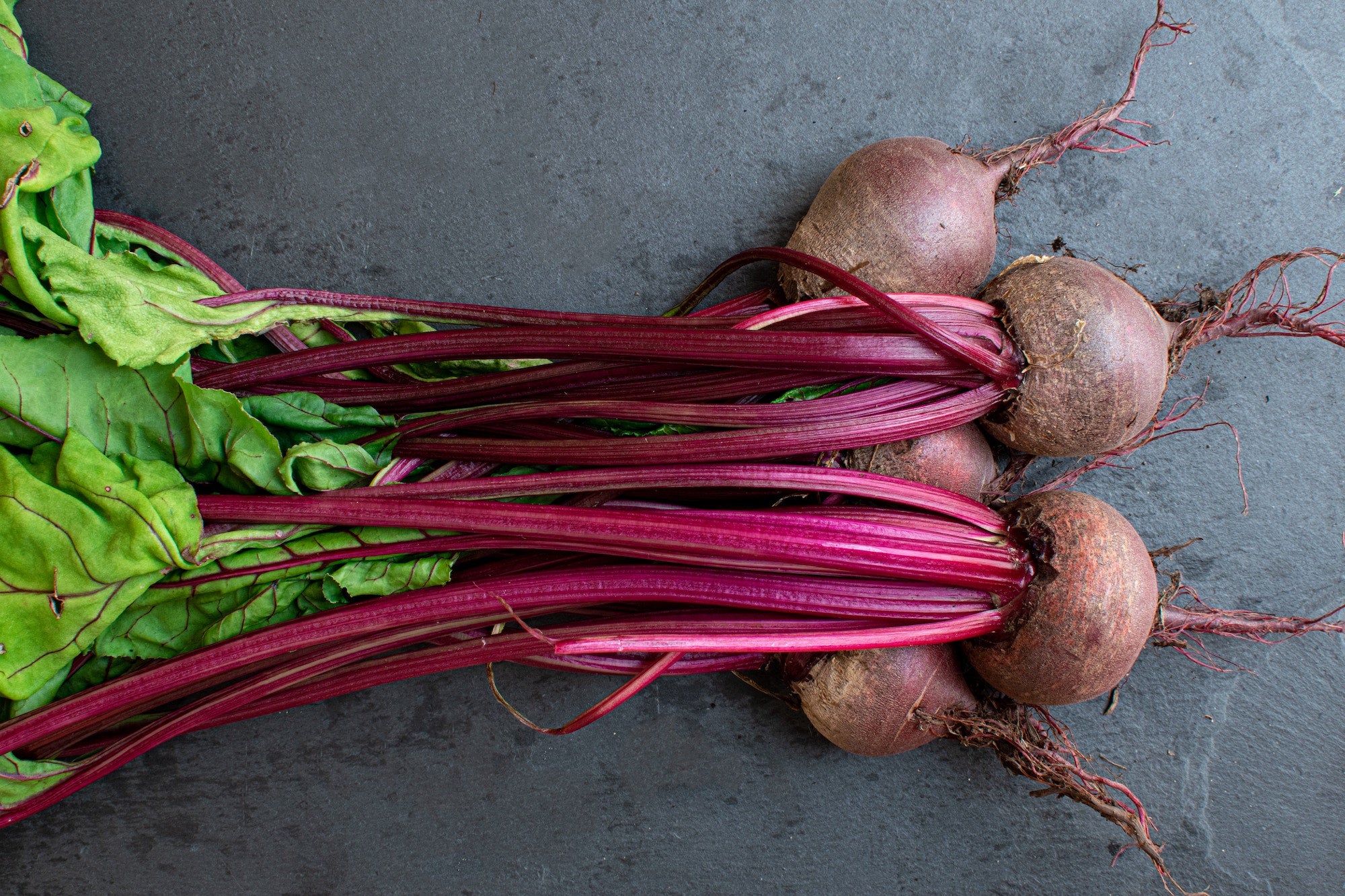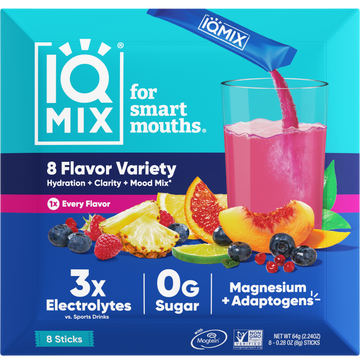Ever feel like your nerves are more frayed than your favorite pair of jeans?
Our nervous system is the HQ for everything that happens in our bodies and brains. But taking care of it may be more of an afterthought than a priority — until things start to go haywire.
If your nervous system craves more TLC, you may experience brain fog, muscle cramps, nervous twitches, anxiety, numbness or tingling in your extremities, and other unpleasant side effects.
So let’s explore what it takes to fuel your nervous system with the nutrients it needs to thrive. We’ll start with a basic rundown of what our nervous system does (and why ignoring it is a big mistake):
What Makes a Healthy Nervous System?
Your nervous system controls all your body’s vital functions, from your breathing, blood pressure, and digestion to your movement and thoughts. It’s divided into two primary branches:
- The Central Nervous System (CNS) consists of your brain and spinal cord. Your spinal cord relays messages between your brain and your PNS. Your brain’s responsible for processing all that intel.
- The Peripheral Nervous System (PNS) is the network of nerves and cells connecting your CNS to every other part of your body.
Just like our diet affects our mental health, studies show that regular exercise, adequate snooze time, and eating the right foods support the health of our nervous system.[*] Doing so helps us achieve:
These are just a few reasons to give your nerves the nourishing VIP treatment they deserve. Let’s dive into the specific gains offered by these:
8 Nutrients & Foods for Your Nervous System
A well-balanced, healthy diet for your nervous system should include:
1. Antioxidants (Especially Flavonoids)
Antioxidants like vitamin C and beta-carotene offer many health benefits for your immune system. They also neutralize free radicals to prevent or minimize cell and nerve damage caused by oxidative stress.
Flavonoids are a specific group of anti-inflammatory plant-based antioxidants. Research shows they boost blood flow to the brain, strengthen connections between nerve cells, and activate new neuron signaling pathways.[*][*][*]
Those benefits slow the development or progression of neurodegeneration while contributing to better working memory and sharper thinking.[*][*]
Score your daily servings of antioxidants and flavonoids from:
- Fruit such as blueberries (aka the “brain berry”), blackberries, strawberries, raspberries, and avocados.
- Dark leafy vegetables like spinach, kale, collard greens, lettuce, etc.
- Low-starch veggies such as broccoli, carrots, artichokes, asparagus, radishes, and squash.
- Herbs and spices like turmeric, parsley, oregano, saffron, clove, cinnamon, ginger, thyme, peppermint, sage, basil, and more.
- Green tea and matcha
- Dark chocolate
😉 Psst! We sneak antioxidants like cocoa, blueberries, and matcha in several IQBAR flavors.
2. Vitamin E
Vitamin E is such a powerful antioxidant for your nerve health that it deserves a special shout-out.
Studies link vitamin E with higher cognitive function and lower rates of dementia.[*][*] Researchers even learned that study participants with the highest vitamin E intake had 36% lower rates of cognitive decline — a perk participants with higher intakes of other antioxidants like vitamin C or beta-carotene didn’t experience.[*]
But here’s the thing: over 90% of Americans don’t meet their recommended dietary intake of vitamin E.[*] Are you one of them?
You can stop overlooking this nervous system nutrient by eating more nuts (almonds, peanuts, hazelnuts, and pine nuts), pumpkin seeds, sunflower seeds, and avocados.
⏩ Shortcut? One IQBAR contains 70-90% of your RDA for vitamin E!
3. Omega-3 Fatty Acids
Your entire nervous system depends on omega-3 fatty acids from your diet.
These healthy fats are essential for building brain and nerve cells and repairing damage to your nerves and neural circuits. You also need them to maintain the structure and integrity of the cell membranes protecting these cells (known as myelin sheaths).[*]
Low omega-3 levels are associated with poor cognition, depression, anxiety disorders, poor anger control, attention problems, and accelerated neurodegeneration.[*]
Good news? Studies suggest omega-3s can reduce brain inflammation, help your neurons communicate better, and prevent neurodegenerative conditions.[*][*] Researchers even say they can help reverse the effects of traumatic brain injury.[*]
Higher intakes are also associated with improved memory, learning, and cognitive well-being.[*]
Excellent sources of omega-3 fatty acids include mackerel, salmon, tuna, herring, sardines, anchovies, nuts (especially walnuts), flax seeds, hemp seeds, and chia seeds.
4. High-Quality Protein
Our digestion breaks down protein into amino acids, which are used to create neurotransmitters.[*] Neurotransmitters (like serotonin, dopamine, and acetylcholine) are chemical messengers that send signals between nerve cells.
Different neurotransmitters have different jobs, influencing everything from our moods and sleep to our focus and cognitive performance. For example, serotonin is tied to well-being and happiness, while dopamine is involved in pleasure and reward.
We must consume enough protein to keep the delicate balance of neurotransmitters in perfect harmony. Bad news? We can’t store amino acids and need a fresh stock each day. Check out these guides to learn how to meet your protein goals:
- The Best Vegetarian Protein Sources
- 9 Healthy and High-Quality Vegan Protein Sources
- Protein on Keto: How Much Should You Eat?
💪 Never fall short on high-quality plant-based protein by keeping a stash of your favorite IQBARS on deck.
5. B Vitamins
There are eight B vitamins, and your nervous system demands at least five of them in its inner circle. Studies show:[*]
- Vitamin B1 (thiamin) supports optimal nerve and brain function. You’ll get it from nuts (macadamias, pecans, cashews, and Brazil nuts), beef liver, seafood, eggs, sunflower seeds, and peas.
- Vitamin B2 (riboflavin) helps your body absorb B6 and B12. Good sources of B2 include spinach, almonds, asparagus, and soybeans.
- Vitamin B6 (pyridoxine) assists in the production of two major neurotransmitters: dopamine and serotonin.[*] It’s also essential for nerve cell communication. Grab your B6 from chickpeas, spinach, tuna, and salmon.
- Vitamin B9 (folate) prevents cognitive impairment, dementia, depression, and spinal cord degeneration.[*] So nosh on dark green leafy greens, peanuts, sunflower seeds, and eggs for that.
- Vitamin B12 (cobalamin) builds up and maintains the myelin protecting your nerve fibers, facilitates nerve function, and plays a role in synthesizing neurotransmitters. The best sources of B12 include fish, shellfish, organ meats, eggs, meat, poultry, and dairy products. Experts strongly recommend B12 supplements for vegans and vegetarians.
6. Choline
Choline is an essential nutrient your body utilizes to make acetylcholine, a neurotransmitter connected with memory, mood, muscle control, and various nervous system functions.[*]
While higher choline levels may contribute to better cognitive performance, emerging research suggests low levels may drive Alzheimer’s disease.[*][*]
Our body doesn’t make enough choline to fulfill its needs, so it’s a must in our diets.[*] But over 90% of Americans do not meet their recommended daily choline intake.[*] Get your choline from sources like poultry, eggs, shrimp, cruciferous veggies, and potatoes.
7. Electrolytes
Electrolytes matter for more than just hydration.
Sodium, potassium, magnesium, calcium, and other electrolytes carry electrical impulses throughout your body, which allow your nervous system to relay signals between your brain, organs, and muscles.[*] Skimp on electrolytes, and those messages will be stuck in unread status limbo.
Don’t have time to keep track of all those minerals? Heard that! Drop an IQMIX into your water bottle to support optimal electrolyte balance with:
- 500 mg sodium
- 450 mg potassium
- 750 mg Magtein®, a clinically studied form of magnesium (magnesium L-threonate) that supports cognition and mood
Our sugar-free, vegan, and keto-friendly hydration mix contains only 3 grams of carbohydrates and 10 calories per packet. Plus, each packet contains 250 mg of super-concentrated lion’s mane — one of the healthiest mushrooms that supports brain health and function.[*]
8. Lion’s Mane
Lion’s mane is nicknamed “the smart mushroom.” When it comes to your nervous system, researchers have seen lion’s mane:
- Exhibit both antioxidant and anti-inflammatory properties[*]
- Stimulate the growth of new brain cells[*][*]
- Relax the mind to reduce depression and anxiety[*][*]
- Increase focus and concentration[*]
- Improve mild cognitive impairment[*]
Lion’s mane stands out because it’s an adaptogen and a nootropic.
Adaptogens are active compounds in plants and mushrooms that help us adapt to stress, so we can remain in a healthy balance.
Nootropics are natural cognitive enhancers that improve memory, focus, learning, creativity, and mental performance.[*] Flavonoids, omega-3s, and vitamin E all fall under the nootropics umbrella.
Though each nootropic works differently, they generally have the power to:[*]
- Protect brain cells from damaging oxidative stress
- Promote neurotransmitter production
- Improve blood flow to the brain, which supplies more oxygen and key nutrients to keep our noggins firing on all cylinders
🍄 Lion’s mane not at your grocery store? You don’t have to go foraging in the woods for it. (Unless you want to; it grows on dead logs in late summer and fall.) We sprinkle the magic of lion’s mane in every IQBAR and IQMIX. Grab an Ultimate Sampler (7 Bars + 8 Sticks) to try it out!
Can Ketosis & Carb Restriction Improve Nervous System Health?
You bet! Conventional nutrition wisdom advocates eating whole grains and complex carbohydrates to provide your brain with glucose (energy), assist neurotransmitter production, and regulate blood sugar levels (thanks to fiber). But you can accomplish all those goals by eating the low-carb foods highlighted in today’s article.
Keto and very low-carb diets transition your body to ketosis, where your brain utilizes ketones for energy instead of glucose. Studies prove ketones are beneficial for brain health, nervous system support, Alzheimer’s, Parkinson’s, traumatic brain injuries, and more.[*][*]
Your Nervous System Cares About What You Eat
So are you fueling it with these eight nutrients and foods it craves?
Make your life easy by adding IQBARs and IQMIX to your routine. They’re a dynamite source of the brain-boosting fare you just learned about. Start caring for your nervous system today and enjoy next-level mental performance tomorrow.
Written by Lauren Ciccarelli, a writer and research geek passionate about low-carb nutrition, mental health, and meditation. Her 2,500+ articles empower doers with science-backed tips for leveled-up living.




